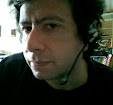Meantime the South pursues a different political course: the Normans found the Kingdom of Sicily (1059), paving the way for the linguistic koinè of Frederick II, the Holy Roman Emperor who will inherit the throne of Sicily (by his mother's side) two centuries later.
By the 11th century North and South have developed two economic systems - one largely based on commerce, the latter on agriculture, one run by the middle-class merchants, the other based on feudalism. The Guelfs (pro-pope) and Ghibelins (pro-emperors) divide Italy's city-states, but the Guelfs are particularly powerful in the North. Such cultural differencies will create a gap that will survive Italy's unification (1861) and that will only widen with the industrial revolution around Milan and Turin (ca 1900).
The only Italian documents dating to the 11th century are the Carta Amiatina (1087), a Tuscan will by one Miciarello (nicknamed "capocotto") who bequeaths his property to the Abbey of San Salvatore (Mount Amiata, Tuscany). The deed contains a footnote in dialect , one of the first documents in Tuscan:
Ista carta est de caput coctu ille adiuvet de illu rebottu qui mal consiliu li mise in corpu
"This paper belongs to "capocotto", may it help him against the evil one who ill-advised him"
Note the archaic traits (left, old Tuscan, center, present-day Italian, right, English :
Ista = questa = ("this", feminine)
Ille, illu = lo (the, masculine)
Mal consiliu = mal consiglio ("bad advice")
li =gli ("to him")
corpu=corpo ("body")
And - how different this is from Dante's Italian which is, conversely, quite free from Latinisms. However, it must also be noted that the notary applied a Latin spelling to Italian words, so some of the words look Latin, but in fact they do not sound like that.
For example, est sounded like modern Italian è (is), illu must be considered an early article and no longer a demonstrative (it will become 'lo' a couple of centuries later), "caput coctu" is an "elegant" rendering of capucottu, "qui" sounded 'ki', as Ital. chi ('who'). Mal consiliu = mal consiglio ("ill advice"), "li" = gli ('to him'), mise ('filled') is modern Italian as well, in corpu is also modern except for the -u ending for -o.





No comments:
Post a Comment